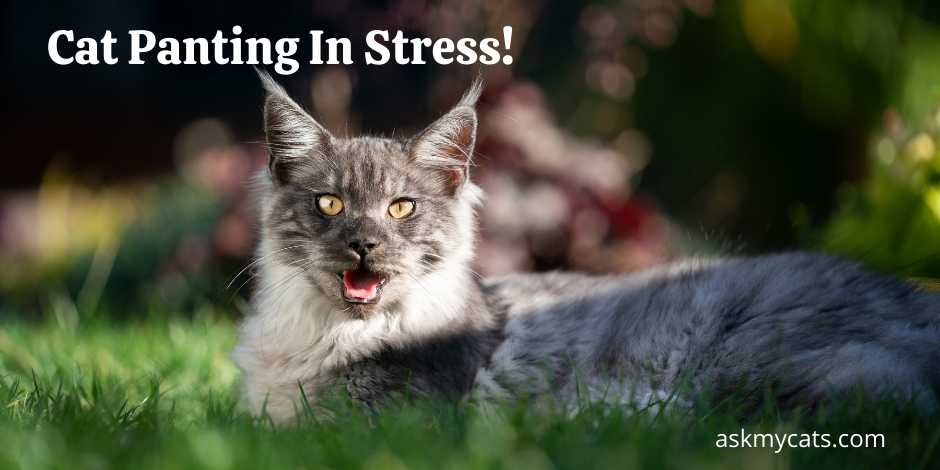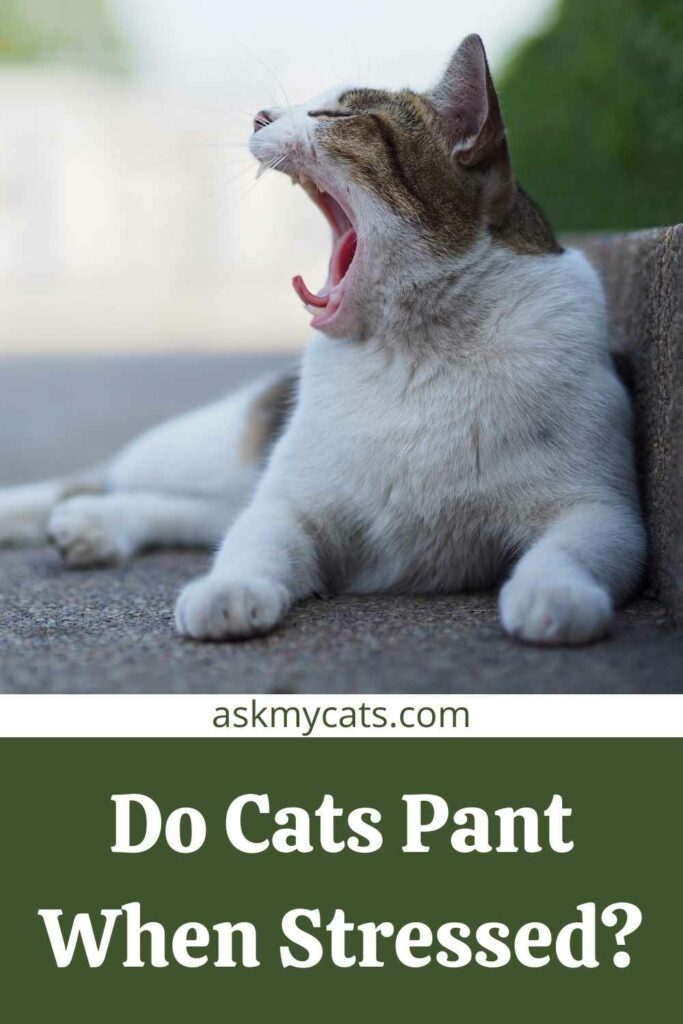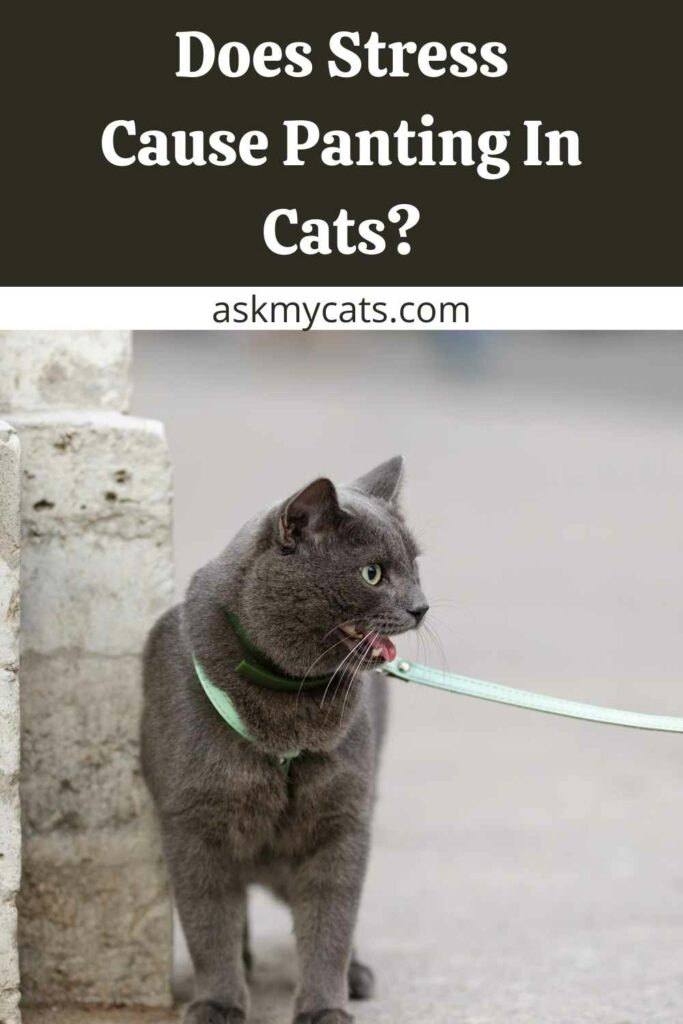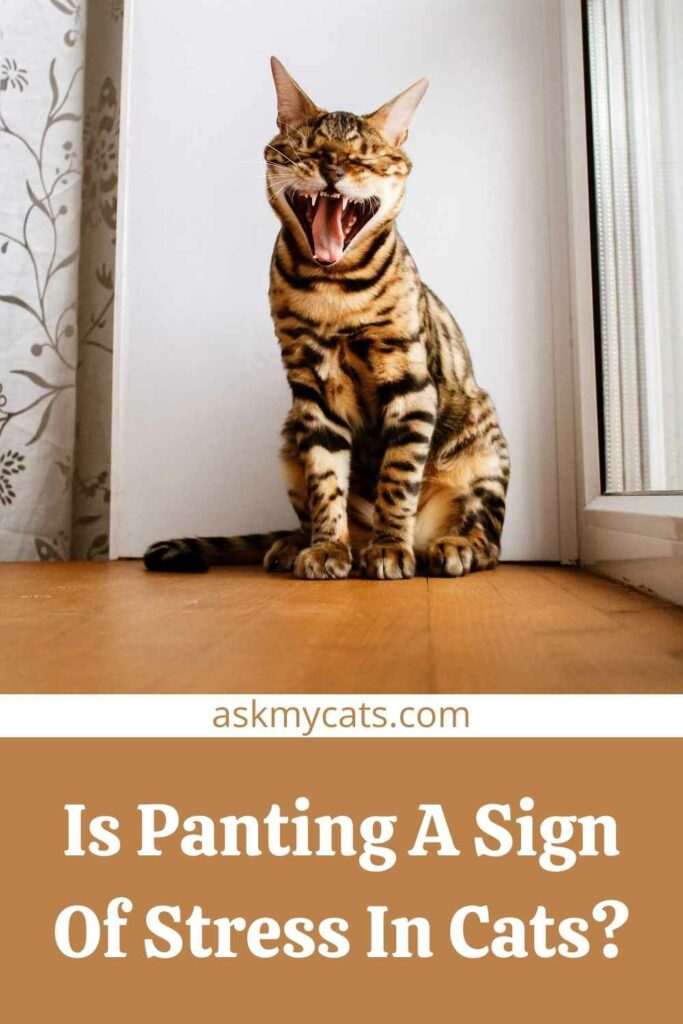Cats’ heat exchange differs from that of humans. Cats do not sweat through their many pores. Instead, minimal perspiration occurs via the pads on the bottoms of their paws.
On the other hand, Cats must pant to expel heat from their body since they are unable to sweat sufficiently. However, it is unusual to observe a cat panting like a dog.
When cats are stressed, they pant. This is a crucial symptom to keep an eye out for so you can intervene to get your cat out of the stressful setting. Since most cats dislike being in carriers or travelling, this may be a circumstance where you’ll observe cats panting if they’re stressed.
This article will discuss the important points why cat pants in a stressful situation.


Give Your Cat the Perfect Day
Get the Free Ebook!
Do Cats Pant When Stressed?
Yes, panting in cats may be a definite sign of stress and worry.

Due to an elevated pulse and heart rate, a stressed cat will exert more breathing effort. Cats normally take 20 to 30 breaths per minute, but open-mouthed breathing combined with panting can be harmful. If your cat exhibits these symptoms, you should take her to the veterinarian right away.
After cats are worried, anxious, or hot, or when they’ve recently played hide and seek with other cats, they may pant. Unlike dogs, though, panting over an extended amount of time is not a frequent feline trait. A cat should normally cease panting once it has had a chance to calm down or rest.
If your cat pants for an extended amount of time, get emergency veterinarian attention since it might be a sign of a major health concern.
Depending on what they are doing and where you are, your cat may be panting because they are too hot, too eager, weary, or stressed.
Perhaps you’ve been trekking in the heat, or they’ve been frantically chasing a toy, or you’re in a car, and they’re worried.
The first step is to figure out why your cat is panting in the first place. Alternatively, your cat may have been dashing up a hiking route. After exerting so much energy, they would be exhausted.
You could be in the car with your cat, and your cat isn’t fond of it. They may be panting as a result of their tension.
The respiratory pattern of a cat should be fluid and unlaboured. Panting is frequently a symptom that your cat isn’t feeling well. When cats are anxious, extremely heated, or undergoing a disease process, they only breathe deeply with their jaws open.
Various factors might cause a sudden spell of labored panting in older cats.
However, panting isn’t just for the elderly. Heart failure, asthma, cancer, fluid buildup in and around the lungs, bronchitis, pneumonia, or a tumor are all major medical disorders that can cause panting.
If your cat is panting, regardless of the cause, you should take him to the veterinarian right away. Blood tests may be performed to screen for heartworm, infections, anemia, and diabetes. Chest ultrasound or X-rays may be used to check for fluid around the heart and lungs.
Also, check out why my cat panting after playing
Does Stress Cause Panting In Cats?
Yes, panting suggests a worried and anxious cat. When a cat pants, it increases its respiratory effort while also speeding up its heart rate.

However, stress isn’t the only factor that causes a cat to pant. It might also indicate asthma, heartworms, or congestive heart failure.
Cat panting is significantly less frequent than dog panting, but it is far more dangerous. Cats pant for several causes, ranging from basic difficulties like being too hot or overweight to more sophisticated issues like stress and respiratory difficulty.
While cooling down your cat or looking into feline weight loss solutions may be your first response, it’s essential to remember that while panting can be a sign on its own, it can also suggest an underlying health concern so that you may see other symptoms as well.
Though your cat pants, even if it’s a hot day, or if they’re anxious, it might mean they’re sick. As a result, having your kitty buddy examined by a veterinarian is a good idea.
Cats pant for a variety of reasons. The reason isn’t always evident, especially when it comes to environmental issues. Heat and stress are two examples of environmental factors that drive cats to pant.
When confined to a cat carrier on the trip to the doctor, many cats may pant, especially if it’s a hot day. Another reason your cat could pant is after exercise, so if they’ve just been excitedly playing with their feline companion, cat panting after playing could be typical.
When their airways can no longer receive enough air into their lungs, cats may pant as a final resort. As a result, even if there is a possible explanation for the panting, there might be an underlying health problem preventing them from breathing properly.
Is Panting A Sign Of Stress In Cats?
Yes, panting can be a sign of stress in cats.

If your cat pants for no apparent reason, it’s probable that they’re having trouble breathing. This might indicate a respiratory problem, such as feline asthma, a respiratory infection, obesity, pregnancy, heart disease, or even cancer.
Your cat may have coughing fits, wheezing, and trouble breathing due to feline asthma. When they breathe, you may notice that their abdomen goes in and out more than usual or that their chest moves more visibly than usual.
Coughing and indicators of breathing trouble are common symptoms of airway infection, but you may also experience sneezing, a nasal discharge, fatigue, or a loss of appetite.
Cats who are overweight or pregnant may pant with their mouth open. This is because their bigger belly makes it difficult for their chest to expand properly when they breathe, causing breathing difficulties.
Also find out Cat Panting After Giving Birth: Know Possible Reasons
Your cat’s gums may be whiter than normal or somewhat bluish if they have a cardiac issue. They may be less active than normal or fatigue more quickly.
Tumors in the lungs or adjacent tissues can produce a wide range of symptoms, including weight loss, appetite changes, and fatigue, as well as pale gums and breathing difficulties.
Why Do Cats Pant When Stressed?
Cats pant when they’re stressed because their heart rate is elevated, and they face trouble breathing properly.
Heavy breathing might also indicate that the animal is overheated because it is excessively hot. Ensure the vehicle’s inside is cool and the carrier is out of direct sunlight and in the shade. If possible, turn on the air conditioner. Throughout the voyage, fresh, cold drinking water should be provided.
Cats are typically quite adept at maintaining their calm. To lick their fur, they normally move to a chilly location on the kitchen floor or sit beneath the shadow of a tree. Unfortunately, this isn’t possible if they travel by car and in a box. It’s your obligation as the owner to make sure they’re at the right temperature.
Panting that isn’t caused by nervousness or a temperature change might indicate something more serious. As quickly as possible, schedule an appointment with your veterinarian.
If you’re traveling with your cat over a long distance, there are a few things you can do in advance to lessen the feline’s anxiety and make the trip more comfortable for the driver and any passengers.
Do Cats Pant When They Are Scared?
Cats pant when they get worried, irritated, or scared in various situations.
You may have seen your cat panting when putting her in the car (because of unusual scents and motion sickness), shoving her into a carrier (due to terrible memories or sensations), or taking her to the veterinarian’s office (strange noises, smells and a person sticking her with needles).
Find out the reasons behind cat panting in car
Cat Open Mouth When Stressed
Cat opens his mouth when stressed because he is facing trouble breathing.
An owner may find it difficult to see a stressed cat open its mouth and breathe. It might be induced by stress or changes in the surroundings, such as relocating or having loud children visit.
Suppose the problem is with the carrier or the automobile. In that case, there are things you can do ahead of time to lessen the possibility of panting, such as exposing the cat to the carrier before beginning a journey or applying a synthetic pheromone spray like Feliway or Comfort Zone before traveling or relocating.
How Do You Calm A Cat Down From Panting?
Take your cat to the veterinarian right away if she has trouble breathing or is breathing excessively.
You’ll want to keep her as stress-free as possible while she’s being transferred. While on the journey to the clinic, keep your cat protected in a box or carrier so that her breathing is not harmed.
Suppose evidence of fluid buildup in the chest is discovered. In that case, your veterinarian will focus on treating the condition by extracting the fluid with a needle and then preventing it from building again.
While most cats handle the needle well, depending on the underlying reason for your cat’s respiratory issues, keeping the fluid from returning may be challenging.
Frequently Asked Questions
Is it bad if a cat starts panting?
Panting, or heavy breathing with the mouth open, in cats, might be considered normal if it occurs shortly after a vigorous play session or kitten zoomies.
Why do cats pant?
When cats are hot, nervous, or after heavy exercise, they may pant. Panting for these causes should subside when the cat has had a chance to relax, cool down, or rest.
What does a cat panting look like?
Panting in cats resembles dogs, but it is not nearly as prevalent. Your cat or kitten will have their mouth open, tongue partially out, and be inhaling and exhaling in tiny shallow gasps.
Final Words
If your cat pants because he is overweight, make sure he gets the proper nutrition and activity. Ensure that your cat has unrestricted access to fresh and clean water during hot and humid weather and that he does not become overheated.
Drop your questions in the comments section below.
